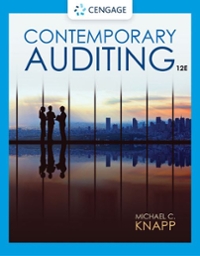The black Toyota minivan made slow but steady progress down the narrow, unpaved road as it approached
Question:
The black Toyota minivan made slow but steady progress down the narrow, unpaved road as it approached the village of Takhli in south-central Thailand, approximately 150 miles north of Bangkok. On either side of the bumpy road were fields of sugarcane, dense thickets of scrub brush, and an occasional rice paddy.
Seated in a rear window seat of the minivan was Michael Wansley, a senior partner with Deloitte Touche Tohmatsu Limited, who was based in that firm's Melbourne, Australia, practice office. The vehicle's four other occupants were Thai nationals and employees of the Kaset Thai Sugar Company. No doubt, the five weary travelers who had spent several hours in the cramped minivan were overjoyed when they finally caught a glimpse of the large sugar mill in the distance that was their final destination. The sugar mill was one of many owned and operated by the Kaset Thai Sugar Company.
For the past several weeks, Michael Wansley had been supervising a debt restructuring engagement for the company's banks and other lenders. Kaset Thai Sugar had defaulted on nearly $500 million of loans to those lenders. Wansley and the 14 subordinates on his engagement team were to study the company's accounting records and business operations and then make recommendations about how the lenders should proceed in attempting to collect all-or, at least, a significant portion-of the outstanding loans.
Wansley, a well-known debt-restructuring expert, had become all too familiar with remote Thailand communities, such as Takhli, over the previous several months because the services of debt-restructuring specialists were much in demand within Thailand during the late 1990s. In March 1999, when Wansley visited the sugar mill on the outskirts of Takhli, the nation of Thailand was mired in a financial crisis. From 1985 through 1995, Thailand had boasted the highest economic growth rate in the world, averaging almost 9 percent annually over that time span. That trend prompted billions of dollars of foreign direct investment in Thailand companies, the bulk of which was in the form of loans.
Thailand's impressive economic growth came to a jarring halt in 1997, undercut by speculative investments, mismanagement, and extensive fraud on the part of business owners and corporate executives. According to one critic of Thailand's freewheeling economic system, "cronyism, collusion, corruption, and complacency" had long been the "four modern horsemen of the apocalypse" in that economy.1 By the late 1990s, hundreds of Thai companies faced bankruptcy, unable to pay back the loans they had secured over the previous decade. In 1999, nearly one-half of the $150 billion in outstanding loans to large Thai companies was classified as "nonperforming"- and it was estimated that $50 billion of that total would never be collected.2
As Thailand's financial crisis deepened, the foreign banks and other lenders that had pumped billions of dollars of debt capital into Thai companies began retaining debt-restructuring specialists in Australia, the United States, and other developed countries to help them determine how to deal best with their mounting portfolios of nonperforming loans. Among the major providers of these debt-restructuring services were the large international accounting firms, including Deloitte, Michael Wansley's firm.
Questions
1. Suppose in the future, you are assigned to an audit engagement that requires you to travel to a foreign country openly hostile to the United States. Because of that hostility, you are uncomfortable with the assignment. What would you do? Before responding, identify the alternatives you have.
2. Do you believe it is appropriate for a professional services firm to ask employees to serve on engagements in which their personal safety is at risk? Defend your answer.
Step by Step Answer:






